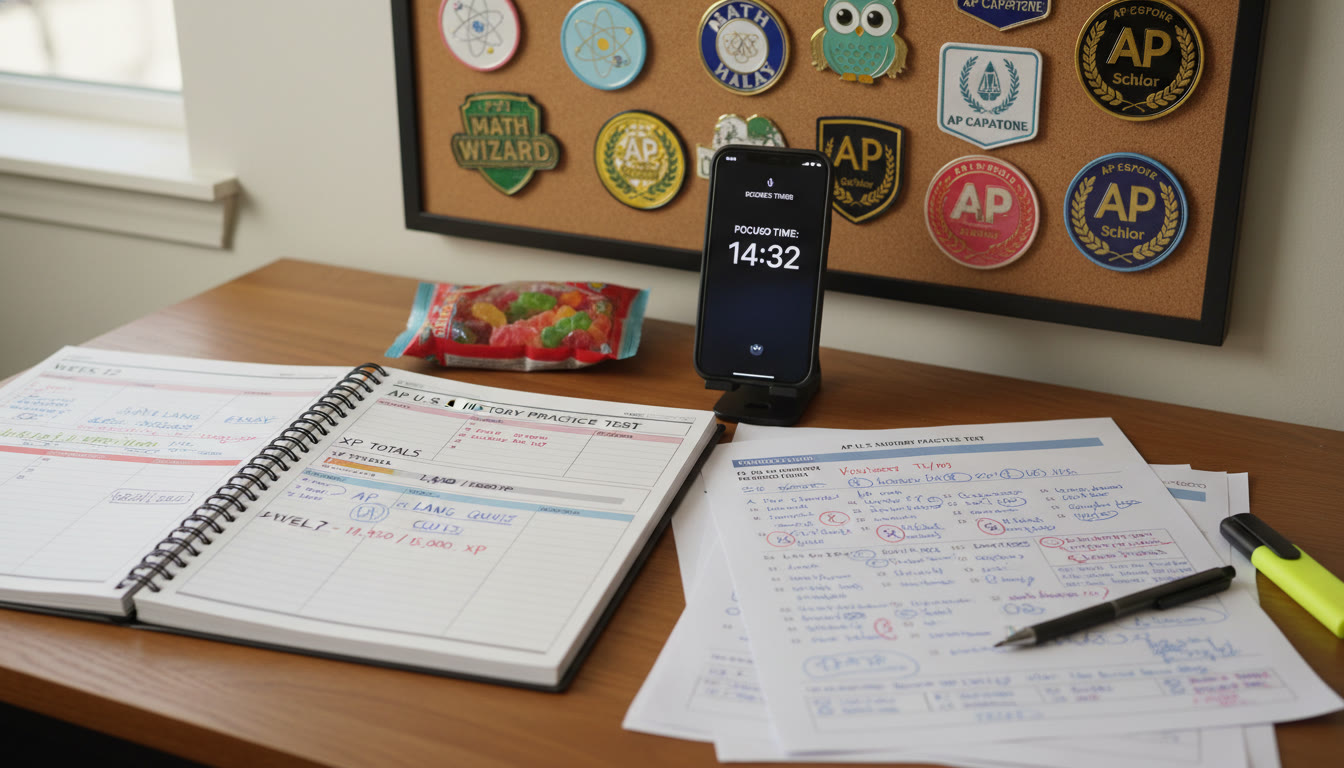Why “Gamify” Your AP Study Routine?
AP studying can feel like an endless climb: dense content, heavy textbooks, practice exams that reveal more gaps than gains. But what if the climb could be joyful—purposeful, rewarding, and even a little bit fun? Gamification is the simple idea of applying game-like mechanics to non-game tasks. For AP students, that means turning chapter reads, problem sets, and timed exams into levels to beat, quests to complete, and trophies to earn. The result: sustained motivation, clearer priorities, better retention, and—yes—joy in the grind.

The psychology behind why gamification works
Games are built around three irresistible ingredients: clear goals, immediate feedback, and incremental progress. Good study systems mirror those elements. When you break an AP course into bite-sized challenges, you create micro-goals. When you track progress—streaks, scores, or checkmarks—you get feedback. When challenges scale in difficulty, your brain experiences manageable novelty that strengthens learning. In short: gamification aligns study tasks with how our attention and motivation naturally work.
Core Mechanics to Turn AP Prep into a Game
Not all gamification needs an app or a scoreboard. Here are core mechanics you can adapt whether you study solo, with friends, or with a tutor.
1. Levels and XP (Experience Points)
Assign XP to tasks so every small win contributes to a larger sense of progress.
- Reading a textbook section = 10 XP
- Completing 10 practice problems = 25 XP
- Finishing a timed practice exam = 150 XP
- Explaining a concept aloud to someone = 40 XP
Set XP thresholds for levels (e.g., 0–500 = Freshman Level; 500–1200 = Scholar Level). Reaching a level unlocks a reward—maybe a favorite snack, a night off, or an hour of gaming. The tangible payoff keeps momentum alive.
2. Quests and Sprints
Design quests (multi-step tasks) and sprints (focused work sessions) to structure long-term and short-term effort.
- Quest example: “Master Unit 3” — Read the unit, make a concept map, complete a practice set, and teach the unit in 30 minutes.
- Sprint example: “45-Minute Focus Sprint” — No phone, one tiny goal: complete 20 AP Calculus problems.
Sprints are perfect for beating procrastination. Use a timer and treat the sprint like a mission: brief, intense, very focused.
3. Leaderboards and Friendly Competition
Competition can be motivating when it’s friendly and supportive. Compare XP or streaks with classmates, or form a study guild with private leaderboards. Remember: the goal is encouragement, not discouragement—keep bars realistic and celebrate all movement forward.
4. Badges and Achievements
Create badges for meaningful milestones: “First Full Practice Exam,” “30-Day Streak,” “Mastered 100 Flashcards.” Badges are psychological markers that make progress visible and memorable.
Concrete Systems You Can Start Today
Below are three ready-to-use systems you can adopt or adapt for any AP subject.
System A — The XP Planner (Weekly Focus)
- Monday: Set 3 weekly quests tied to exam skills (e.g., thesis writing for AP English).
- Daily: Log XP earned for each task; aim for 60–100 XP per day.
- Weekend: Review, summarize mistakes, and claim rewards for the week.
System B — The Sprint Ladder (Daily Habit)
- Morning: 25-minute sprint for hardest task.
- Afternoon: 45-minute sprint for practice problems.
- Evening: 20-minute sprint for review or flashcards.
- After each sprint: Earn a micro-reward (5–10 minutes of free time).
System C — The Guild Method (Social Learning)
- Form a small group (3–5 peers) studying the same AP course.
- Hold weekly “challenge nights” where members quiz one another.
- Rotate roles: quizmaster, reviewer, and explainer.
Tools and Materials That Enhance Game-Style Study
You don’t need fancy software to gamify study, but certain tools can make the experience smoother and more visual.
- Sticky notes and a whiteboard for visible XP and quest trackers.
- Timers and Pomodoro apps for sprint management.
- Spreadsheet or habit-tracking apps to log XP/levels.
- Flashcard apps with spaced-repetition for retention.
| Tool | How It Helps | Example Use |
|---|---|---|
| Whiteboard | Visualizes progress and goals | Map weekly quests and draw a XP bar |
| Pomodoro Timer | Enforces focused sprints | 4 cycles of 25/5 to tackle problem sets |
| Spaced Repetition App | Improves long-term memory | Daily review of missed AP vocabulary |
| Note-Taking Template | Standardizes review and reduces cognitive load | Summary, examples, mnemonics, and 2 practice Qs |
Designing Rewards That Actually Work
Not all rewards are created equal. The most motivating ones tie to meaning (time with friends, creative projects) or restore energy (sleep, favorite food). Make reward tiers meaningful. Micro-rewards after sprints, medium rewards after weekly goals, and a big reward for major milestones like completing a full practice exam or mastering a unit.
Examples of Effective Rewards
- Micro: 10-minute phone check, a stretch and walk, or a favorite song.
- Medium: A movie night, recent novel, or coffee shop outing.
- Big: A day trip, new headphones, or a celebration meal with family.
How to Keep It Sustainable: Avoid Burnout
Gamification can backfire if it becomes another source of pressure. Here are guardrails to keep the system healthy.
1. Prioritize Sleep and Recovery
XP matters less if you’re burned out. Build rest days into your calendar and make them non-negotiable rewards.
2. Keep the Stakes Low but the Meaning High
Framing matters. Reward completion and improvement rather than raw scores. Celebrate the process: the persistence and strategy you develop.
3. Recalibrate Goals Monthly
If XP targets are consistently missed, recalibrate—adjust difficulty, change rewards, or shorten sprints. Flexibility keeps the system alive.
Examples: Gamifying Specific AP Subjects
Different AP exams demand different approaches. Below are tailored examples to show how gamification maps to subject needs.
AP Biology
- Quest: “Cellular Systems Mastery” — 100 flashcards, 2 practice passages, 1 concept map.
- Badge: “Lab Logic” for perfect lab-report structure on two practice labs.
- XP Tip: Allocate extra XP for drawing mechanisms from memory.
AP US History
- Quest: “Comparative Argument” — write one comparative essay under timed conditions.
- Badge: “DBQ Dominator” after 3 DBQs showing improved thesis clarity.
- XP Tip: Earn bonus XP for connecting a primary source to a thematic argument.
AP Calculus
- Quest: Complete three timed sections of past exams with 70% accuracy.
- Badge: “Limits Legend” for solving 20 limit problems without calculator.
- XP Tip: Extra XP for teaching a problem solution to a friend or tutor.
When to Bring in Personalized Help (and How to Gamify That)
Sometimes progress stalls despite your best efforts. That’s a signal to bring in expert support. Personalized tutoring adds structure, expertise, and tailored practice—exactly what gamification thrives on.
How Tutoring Supercharges Game-Style Study
- 1-on-1 Guidance: Tutors can pinpoint weak spots and assign quests targeted at those gaps.
- Tailored Study Plans: A tutor can calibrate XP values to reflect real learning difficulty.
- Expert Feedback: Immediate, high-quality feedback accelerates progress and refines goals.
For example, Sparkl’s personalized tutoring can transform your gamified routine by setting precise milestones, offering mock exam sprints, and providing AI-driven insights that highlight which quests will move your score the most. When study becomes a team effort between you and a tutor, your XP gains become strategic rather than purely habitual.
Tracking Progress: What to Measure
Not everything measurable matters, but tracking the right metrics helps you make better decisions.
| Metric | Why It Matters | How to Track |
|---|---|---|
| Accuracy on Practice Questions | Core indicator of content mastery | Record percent correct per topic weekly |
| Time Per Question | Shows pacing and efficiency | Use timed sections and log averages |
| XP Earned | Reflects consistency and effort | Daily logging in a planner or app |
| Streak Length | Measures habit formation | Track days of completed sprints |
Sample 8-Week Gamified AP Prep Plan
This hypothetical plan assumes ongoing coursework and aims to level up knowledge and exam skills through progressively harder quests and checkpoints.
Weeks 1–2: Foundation
- Create your XP system and set weekly quests.
- Complete 2 topic mastery quests per week (light intensity).
- Start a 20-minute nightly review sprint for spaced repetition.
Weeks 3–4: Skill Building
- Introduce timed practice sections (45–60 minutes).
- Earn badges for completing first full practice exam.
- Begin one tutoring session every 7–10 days if needed.
Weeks 5–6: Simulation
- Take two full practice exams under test conditions.
- Use detailed error logs to create targeted mini-quests.
- Increase sprint length for problem-heavy subjects.
Weeks 7–8: Polish and Confidence
- Fine-tune pacing and timing strategies.
- Celebrate major milestones and set a relaxing, confidence-building pre-exam routine.
- Optional: Final one-on-one sessions to close remaining gaps (Sparkl can help structure these).
Real Students, Real Wins: Short Vignettes
Stories help make systems feel possible. Here are three short, realistic vignettes showing how gamification can change study life.
Case 1 — Mia, AP English
Mia converted essay practice into “argument quests.” She earned bonuses for each new rhetorical device she used authentically. Within six weeks her essays were clearer and scored higher on peer reviews—mainly because she practiced targeted techniques instead of aimless writing.
Case 2 — Jamal, AP Chemistry
Jamal used a whiteboard XP tracker and a weekly “lab badge” system. He paired with a tutor for hard topics. The tutoring sessions transformed XP into deliberate practice: his mistakes turned into quests, and his confidence soared.
Case 3 — Priya, AP Statistics
Priya gamified practice problems with a guild of friends. They held weekly challenges with small stakes—loser brings snacks. The social accountability made consistent practice fun and sustainable.
Common Pitfalls and How to Avoid Them
Gamification is not a silver bullet. Here are common traps and quick fixes.
Trap: Chasing Points Instead of Understanding
Fix: Make comprehension a criterion for XP—only award full XP if you can explain or apply the concept.
Trap: Rewards Lose Their Luster
Fix: Rotate rewards and tie them to meaning, not just novelty. Keep some surprises.
Trap: Comparison Kills Motivation
Fix: Use private leaderboards or celebrate personal bests rather than raw rank.
Bringing It All Together: Your Personalized Game Plan
Start small: design one quest, schedule three sprints this week, and assign XP. Track one metric—accuracy or streaks—and tweak from there. If you hit a plateau, consider personalized tutoring. A targeted tutor can turn your XP system into a strategic plan, identify which quests yield the largest score gains, and give you the expert feedback that’s hard to replicate on your own. Sparkl’s personalized tutoring, for example, pairs one-on-one guidance with tailored study plans and AI-driven insights—helpful when you want your game to map directly onto exam success.

Final Words: Make Study a Game You Want to Play
AP prep is a marathon of learning, not a sprint of endurance. Gamifying your study routine helps you turn a long uphill road into a sequence of meaningful, beatable challenges. It gives you feedback, a sense of control, and the small joys that sustain performance over weeks and months. Keep the system flexible, focus on understanding, and reward yourself for persistence. If you want a tailored plan or someone to help translate your XP into real score improvements, personalized tutoring—like the one offered by Sparkl—can be the strategic ally that keeps your momentum alive.
Remember: the goal isn’t to make studying a perpetual game—it’s to make it a deliberate, motivating practice that leads to mastery on exam day. When you design your system around progress, learning becomes less of a grind and more of an adventure you actually want to continue.
Now: pick one quest, set a timer, and start your first sprint. Level up.















No Comments
Leave a comment Cancel